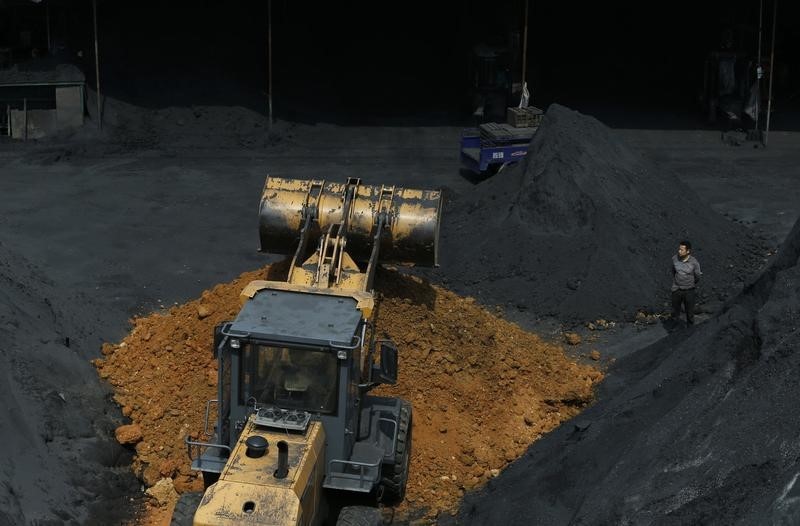(The opinions expressed here are those of the author, a columnist for Reuters.)
By Clyde Russell
LAUNCESTON, Australia, Sept 26 (Reuters) - It appears that China is interpreting the "people's well-being" as meaning North Korea should be able to export record amounts of coal in defiance of sanctions against the rogue nuclear-armed state.
China imported 2.465 million tonnes of coal from North Korea in August, the highest on record, and 61 percent above what was bought in April, the month sanctions were supposed to take effect.
Tougher measures were imposed by the United Nations in March aimed at starving North Korea of funds for its nuclear and ballistic missile programme. China said at the time it would ban imports of gold and rare earths, as well as coal. coal imports from North Korea did slip in April to 1.527 million tonnes from March's 2.345 million, they have been steadily trending higher since then to reach August's record.
Some exemptions were to be allowed for imports from North Korea for the what was translated as "the people's well-being," or "livelihood purposes."
This would appear to be a very broad exemption as other than the brief decline in April, imports of North Korean coal have been rising, allowing the country to once again become China's third-biggest supplier of the fuel behind Australia and Indonesia.
China's imports of North Korean coal are up 11.7 percent for the first eight months of the year compared to the same period last year, slightly below the 12.4 percent gain for total coal imports.
So far, the big winners among coal exporters to China are Mongolia, with a 50.1 percent year-to-date increase and Indonesia at 18 percent.
Top supplier Australia is down 3.6 percent for the first eight months of the year, as higher coking coal exports haven't been enough to offset lower thermal coal shipments.
It's difficult to ascertain why China has decided to allow its coal trade with North Korea to continue, and indeed to grow.
About 90 percent of Pyongyang's trade is with China, and coal accounts for nearly 40 percent of that in value terms, according to a Sept. 24 report in the Nikkei Asian Review.
This means coal is an essential lifeline for North Korea, and it also means China has an extremely powerful hold over its neighbour, should it choose to exercise it.
But it's also likely that the coal trade with North Korea has prospered this year as type of coal supplied by Pyongyang is in high demand.
ANTHRACITE IN DEMAND
North Korea's exports are almost exclusively anthracite, a high-grade hard coal that Chinese buyers use mainly for steel and ceramic manufacture, as well as for blending with other coal types to burn to generate power.
Of China's 17.28 million tonnes of anthracite imports in the first eight months of 2016, North Korea supplied 14.91 million, equivalent to an 86.3 percent share.
This is way ahead of the 1.44 million tonnes that number two supplier Russia shipped during the first eight months of the year, and this figure is down 18.3 percent from the same period in 2015.
Part of the appeal of North Korean coal is no doubt cost, with August's cargoes arriving at $45.55 a tonne, which is well below the $70.25 that Russian anthracite cost.
Australian cargoes are also more expensive, with coking coal used in steel-making arriving in August at $93.92 a tonne, and bituminous coal, used in power plants, costing $52.76.
North Korean coal is thus attractive to Chinese buyers, especially in the light of Beijing's largely successful efforts to curb output this year.
In fact, China may have been too successful in lowering domestic coal production, last week allowing 74 major miners to increase output of thermal coal, Reuters reported on Sept. 23. appears that China's domestic coking coal miners have so far been unsuccessful in their efforts to get permission to boost output in order to lower prices, which have surged this year amid a tighter market.
Australian premium hard coking coal .PHCC-AUS=SI has jumped 164 percent to end last week at $206.40 a tonne, providing a bonanza for major miners like BHP Billiton (LON:BLT) BHP.AX , which together with partner Mitsubishi 8058.T is the largest exporter of the fuel.
The higher coal prices, and the relative cost advantage enjoyed by North Korea, makes it unlikely that Beijing is about to effectively implement sanctions against Pyongyang.
Of course, nothing is certain in politics, but in the absence of a change in Beijing's policy, it's likely the world's most reclusive state will continue to enjoy its coal lifeline.
<^^^^^^^^^^^^^^^^^^^^^^^^^^^^^^^^^^^^^^^^^^^^^^^^^^^^^^^^^^^ Graphic of China's coal imports from North Korea vs. Australian coking coal price.
http://tmsnrt.rs/2dl5fX9
^^^^^^^^^^^^^^^^^^^^^^^^^^^^^^^^^^^^^^^^^^^^^^^^^^^^^^^^^^^> (Editing by Christian Schmollinger)
